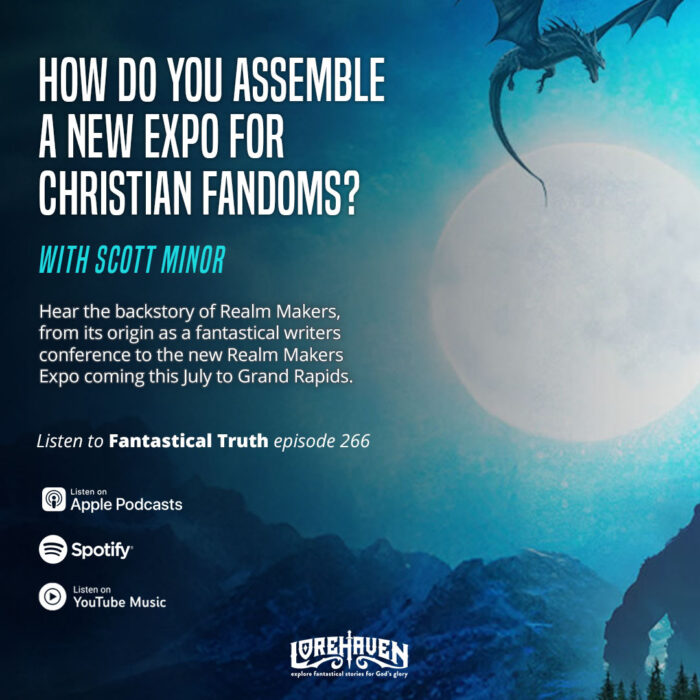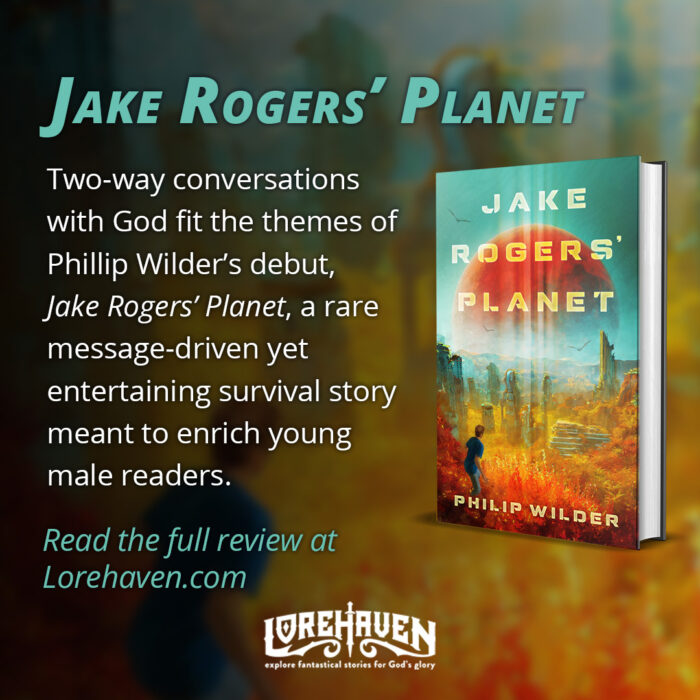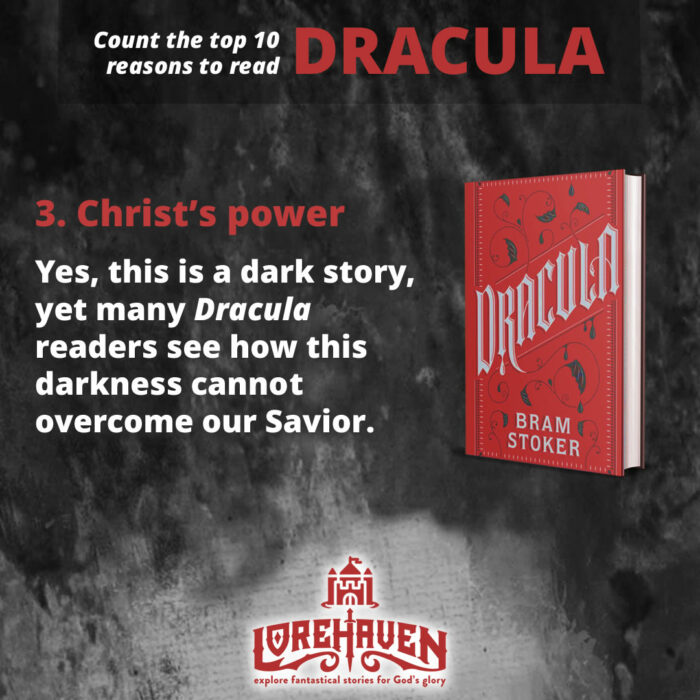I’m No Horror Fan, But I’ve Grown to Love Bram Stoker’s Novel ‘Dracula’
In spring 2018, I first read Bram Stoker’s 1897 novel Dracula.1 You might say I read the book six months earlier than the most seasonal time to read it, Halloween.2 But in fact, I feel that I actually read the book—for the very first time—perhaps twenty years too late.
I enjoyed Dracula way more than I thought I would, and I hope you’ll do the same.
Sure, we’ve creaked open the great doors and invited many Christian horror fans into the Lorehaven castle. Mike Duran showed how “Horror Reveals Human Sin in the Dark.” C. W. Briar explained that “Werewolf Tales Reveal the Beast Inside.” Parker J. Cole explored “How H. P. Lovecraft’s Cosmic Horrors Turn Cliché.”
Nonfiction helps us analyze the horror genre and its monsters. But for me, actually reading a horror classic helped me develop appreciation for you horror fans. “Ah,” said I, having finally finished Stoker’s Dracula for the first time. “So that’s why you love this.”
By no means can this horror newbie analyze the story, review this classic, or try to explain vampire lore to you. Nor would I make this article explore apologetics for the horror genre, because our previous writers well cover that topic. Instead, I’d like to share a few responses I had during and after finishing my first read of Dracula.
After you read these, come join our new Dracula book quest in the Lorehaven Guild!
1. I felt strangely glad to discover all the vampire tropes.
When I joined Jonathan Harker, rolling into Transylvania for the first time, I had this bizarre sense. I felt that Dracula might be like one of those old genre books that you suspect doesn’t have a lot of genre in it. This now feels silly, but I thought: What if the book barely had any vampires? What if it were just some dry pseudo-historical tale, and in fact the modern vampire—cape, fangs, and all—was all modern adaptation?
Again, what a silly suspicion. Once our villain himself confronts poor Mr. Harker, the genuine horror leaps out of its coffin. And I found I was weirdly enamored by this.
Yes, folks, here he was, Mr. The Count himself, dwelling in his creepy castle in the mountains with lightning and terrified locals and everything. He had every feature I expected. Creepy gentility. Pointed teeth. Invisibility in mirrors. Craving for human blood. Aversion to garlic and religious symbols. And he had fog– and bat-based transformation powers (at minimum). He also had dark powers I hadn’t expected, such as the ability to control creatures of the night, plus a harem of she-vampires.
But as for the notion that vampires explode in the sunlight? That’s a myth, at least insofar as Dracula is concerned. Stoker’s vampires don’t do this. They simply lose their powers and become as mortal men. That makes a lot more sense.
2. I was repulsed and fascinated by the vampires’ sensuality.
I’m no late-19th-century Gothic literature scholar. So I don’t know how much Stoker’s style and themes followed or diverged from expectations of the era.3
But I do know that even 120-plus years after the book published, Dracula and his three vampire henchwomen were described as overtly sensual and sexualized.
Stoker, to be sure, shows more restraint than a modern author would. Yet he shows exactly what these henchwomen do and say when they confront a paralyzed Jonathan Harker. That restraint almost makes them worse. He’s fascinated by them, with lips and teeth and such. I grew rightfully uncomfortable hearing it all.
Christians find many parallels in Jonathan’s temptation. For example, see the many frightening fates that befall victims of the adulteress in Proverbs 7:21–23.
In our world, people literally reject the gospel of Jesus Christ because he challenges their particular sexual appetites. I think it’s time for Stoker-style vampires to make a comeback, especially with their fleshly lusts. The story shows these for what they are: “dishonorable passions … contrary to nature” (Romans 1:26).
3. I found Stoker’s female characters (mostly) strong.
As a male reader, I love stories in which female characters act like, you know, human beings, with their own wills and opinions and agendas. The best stories do this so well with female characters that their readers don’t even need to write awkward calling-attention-to-it paragraphs like this one.
Dracula is clearly set in Stoker’s version of the Victoria era, so in theory, many things could have gone wrong with the authors’ portrayal of the female vampires’ sex appeal, and even with his virtuous heroines. He could have tried a “female sexuality is inherently flawed” theme. But I saw no evidence for this. In fact, Count Dracula himself is shown as super-sensual. His hyper-“masculinity” masks his evil.
Moreover, female leads Mina Murray (later Mina Harker) and her friend Lucy Westenra hold their own as flawed yet virtuous heroines. Again, you may want to avoid even talking of the “Strong Female Character” for risk of bringing it all down.
Still, one portion of the novel makes me chuckle a bit. This occurs later in the tale, when the gentle, elderly scholar (not beefcake action star) Dr. Van Helsing and his posse of male vampire-hunting recruits praise Mina for her most excellent and womanly virtues. Really, they say, there is no one equaled in all civilized society who has not the courage and the fortitude for such an endeavor, etc., etc. They’re all correct. But their rhapsodies do go on, seeming to oversell Mina’s genuine strength.
Stoker’s heroines are truly strong, even when their male admirers try to withhold information from one or two women, lest they become unwell. But in fairness, the heroes also keep secrets from other men. And of course, Jonathan Harker himself suffers what can only be described as post-traumatic stress after Dracula’s abuse.
4. I think I can join fans who despise ‘teen vampires.’
Dracula is so captivating and so genuinely evil a figure—with just enough empathy to provoke a finale tinged with tragedy—that I can now empathize with those fans who resent the Twilight-ification of vampire lore.
Sure, I just got here. So I won’t pretend I can “culturally appropriate” the fandom for you professional vampire fans. But I can, at least, see why you particularly loathe the watered-down “sparkling” vampire.4
5. I found Dracula’s religious elements captivating and plausible.
Hellboy uses bullets made of saints’ bones. Every other vampire-killing action star has other mystical-related weaponry. From what I can tell, this is because Dr. Van Helsing first used uniquely religious elements to subdue Dracula. For example, this gentleman scholar (and husband, father, loving God-fearing man) uses sacramental bread from the ceremony of Mass to keep Dracula out of his places of refuge.
Of course, the Irish-born Stoker likely had in the back of his mind the Catholic belief in transubstantiation. This is the belief that bread is literally transformed into Jesus’s body during the Mass. So, in this universe, the evil Dracula is literally defeated—at least in part—by elements of the literal slain body of Jesus Christ.
That works for me. At the same time, I couldn’t help but develop a little headcanon. What if, in fact, it’s the association of these elements—in some spiritual way—with Christ and one of his church’s activities that actually deters Dracula? For example, would you have to use “consecrated” bread to ward off vampires with spiritual power? Would a page of Scripture work just as well? Or a simple cross necklace?
6. I wanted to learn more about Dracula.
By now I’ve read Dracula twice—the first by listening to Librivox volunteers, the second by listening to the Audible version (with Alan Cumming and Tim Curry). For the Lorehaven Guild book quest this month, I’m reading this book yet again.
With each re-read, I feel more curious, not just about Stoker’s created world, but the lost Judeo-Christian world that created him.
Sure, I’ve done some research into Stoker and the older tales from which he drew to create the modern vampire template. I’ve also read fascinating articles about the Icelandic translation/remake of the novel, and the fact that Stoker believed at least some of his fictional elements were based in reality. And, of course, I’ve been made grossly aware that some people claim to be “vampires” who drink human blood.
Yet ultimately I’m far more interested in Dracula’s effect on my inner world. With each read, I find myself more repulsed by the evil of sin and more compelled by the power of Christ. And that’s exactly what God-glorifying horror should make us do.
View this post on Instagram
- This article was originally published under the title, “A Horror Newbie Discovers Dracula.” We’ve republished this here with some updates. ↩
- Interestingly, the book’s chronology actually starts in the spring, on May 3. ↩
- English professor Geoffrey Reiter does know more about Stoker’s work and his cultural background. Explore Dracula with him as guest in Fantastical Truth ep. 39. How Might Bram Stoker’s Novel ‘Dracula’ Cast Light Against Modern Vampires? ↩
- We Christian fans of horror stories (I say we, for I’m now One Of You) may also want to add the Hotel Transylvania movies to our criticism. Yes, Twilight tries to positively teen-sex up the vampire. But perhaps worse, the animated movies turn this evil figure into a wacky cartoon character. ↩





































I read “Dracula” for the first time some years ago as a skeptic and was pleasantly surprised by the depth and awesomeness I found in it. It quickly became one of my favorite books! The genuinely Christian elements move it into true excellence.
Re Point 3, especially the last paragraph, from my (by no means exhaustive) reading of Victorian “sensational” or popular literature, I find that it tends to be more realistic about physical and mental limitations than some modern stories. Men are portrayed as having weaknesses, even as women are (which is all anyone seems to remember), and sometimes deal with severe health issues after their exciting adventures.
Re the third footnote (and sparkly vampires), I don’t mind a few cheesy vampires, because much of their horrifying power is robbed by cartoonizing them. In fact, Dracula invented so many tropes and is so different from previous versions of vampires that I sometimes find him a little cheesy himself. For a story involving old vampire myths, I highly recommend reading “The Cruel Painter” by George MacDonald, which is funny and scary and wonderfully complex.
Other books building on the Dracula lore do say crosses and other symbols of faith would work. More modern books will say it’s the symbol of faith, not the Christian faith that works.